In April 2013 Jill Evans and Jane Natai, two members of Cwlwm Monduli Carmarthen-Tanzania Link, delivered two emergency doctor’s packs, received from International Health Partners, to Monduli District Hospital in the Arusha Region of Tanzania. The medical supplies were officially received by Dr Zavery Benela, District Medical Officer, in the presence of medical and nursing staff of the hospital and local representatives of Cwlwm Monduli.
Another consignment of small medical equipment was delivered to our local representative in 2017.
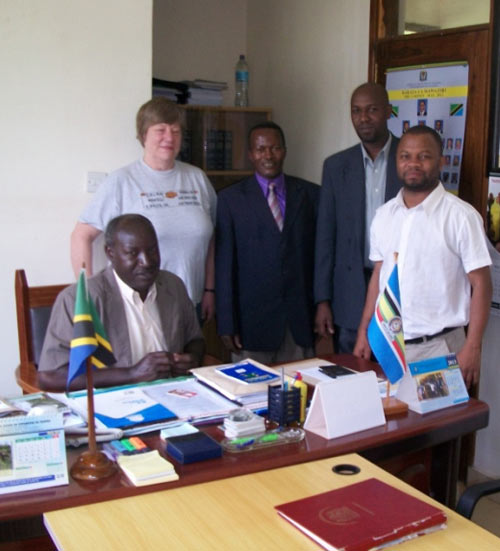
Official hand-over to Dr Benela, District Medical Officer, Monduli Hospital
No problems were encountered with the transfer of the packs between planes in Nairobi. As the luggage had been bubble wrapped it was clear that they had not been interfered with in transit. At Kilimanjaro airport Jane Natai’s fluency in Swahili facilitated passage through Customs, where the Senior Customs Officer only required one box to be opened to confirm that it did contain medical supplies, as stated on the packing list and Tanzania Food and Drugs Authority permit.
The packs were officially received by Dr Benela, who confirmed that they would be distributed to 28 rural dispensaries and 3 rural health centres administered by Monduli District Hospital, to be dispensed free of charge to patients according to need. The medical supplies were immediately secured in the hospital pharmacy, under the supervision of the pharmacist Mr Kasunga, who has been given responsibility for issuing the drugs to the rural dispensaries and health centres wherever shortages have been identified.
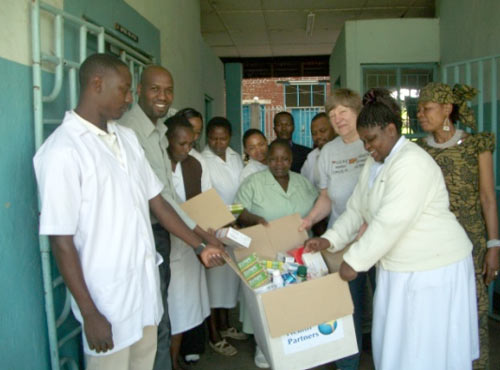
Five rural dispensaries administered by Monduli District Hospital were visited. They deliver medical services to isolated villages, populated mainly by Maasai. Every dispensary has a qualified doctor and nurse midwife living on site, with in some cases an additional nursing assistant. Since our last visit, 18 months previously, there has been a marked improvement in the supply of free medicines to the hospital and rural dispensaries from the local national government distribution centre. However, the District Medical Officer reported that shortages of up to 10% of regular orders are common, and demand far exceeds supply.
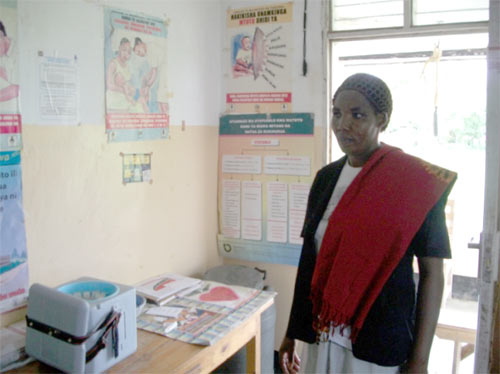
Midwife Anna Akweso in Mti Mmja Rural Dispensary
Mti Mmja Dispensary serves a population of approximately 4100 with 168 under 5’s and 85 pregnancies in 2013. The midwife and nursing assistant give ante natal advice, deliver babies if transport to the hospital is not available, monitor mothers and babies during the first 5 years including vaccination, and give contraceptive advice. Mothers and babies commonly suffer from poor nutrition. Pregnant women are routinely tested for HIV and TB. The doctor treats mainly respiratory diseases and diarrhoea, but eye diseases, malaria and occasionally typhoid are also a problem.
Since our last visit Monduli District Hospital has secured a donation from Japan of gas-powered refrigeration boxes for all its dispensaries to store vaccines supplied by the Government, which are administered free of charge to all children under 5 and to pregnant women. Demand for vaccines is very high from both village settlers and nomadic Maasai. However, bottled gas is expensive and supplies erratic. Solar panels would be a more sustainable power source if their security can be ensured.
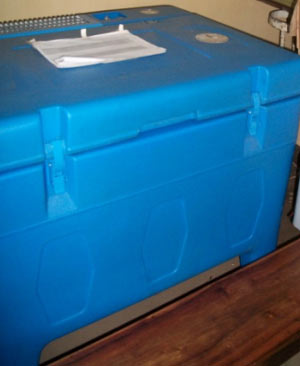
Gas refrigerator for vaccines
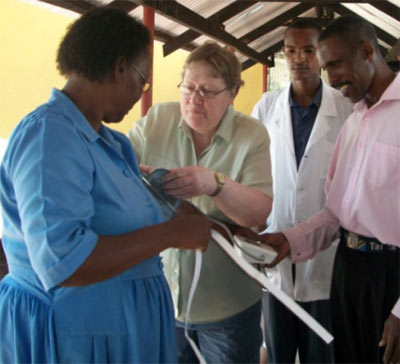
Jane Natai demonstrates a blood pressure monitor
Midwives in the hospital and rural dispensaries have no blood pressure monitors to assess mothers during pregnancy. Cwlwm Monduli donated monitors to the hospital and 4 dispensaries. 20 stetho-scopes were donated to doctors and midwives.
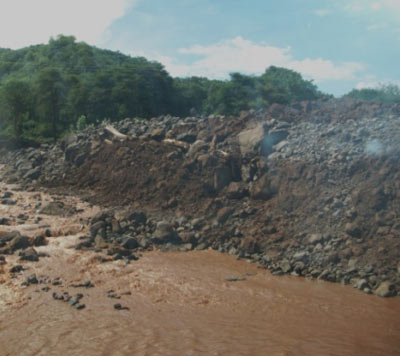
During the visit thunderstorms and flash floods were experienced, which killed 11 people and disrupted transport on main roads due to rock slides and washed out bridges. This followed tow years of drought. Doctors reported that the main medical conditions encountered are respiratory diseases and diarrhoea, so the delivery of the IHP emergency doctors packs at this time was particularly opportune.